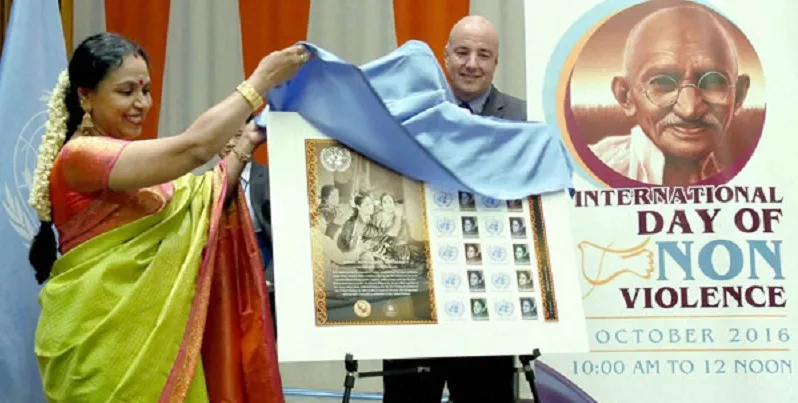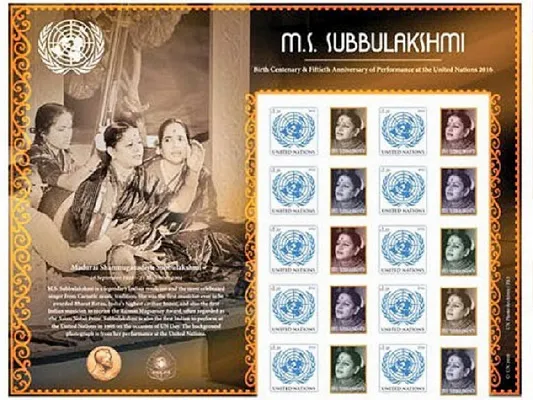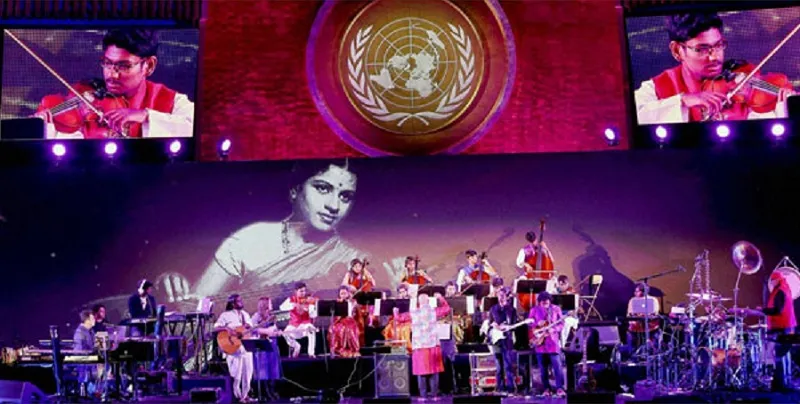Marking 50 years since the legend performed at the General Assembly, UN honours MS Subbulakshmi
The UN has released a postage stamp to honour India's most celebrated Carnatic music artist MS Subbulakshmi, who had performed at the world body 50 years ago. The USD 1.20 value commemorative stamp issued by the UN Postal Administration in the honour of MS has the iconic blue emblem of the UN alongside her picture. This year also marks her birth centenary.

The stamp was released at a special ceremony at the UN headquarters to mark India's ratification of the historic Paris climate deal. It was attended by several dignitaries who hailed the country's move to combat global warming. The ceremony concluded with a soulful rendition by Carnatic music singer Sudha Raghunathan of MS Subbulakshmi's music as well as of Gandhi's beloved 'Ram Dhun'.
Raghunathan performed songs in seven languages, including Bengali, and received a standing ovation from the audience. The first stamp was presented to Raghunathan to honour her performance at the UN, according to a PTI release.

Kunjamma, as MS was called, was born in Madurai on September 16, 1916, to veena player Shanmukhavadivu Ammal and Subramania Iyer. Her grandmother Akkammal was a violinist. Her mother, was from the devadasi community, and performed on stage regularly. She had a meager income, and had to support a family of three children, uncles, brothers, and their wives.
Initiated into music at a young age, Kunjamma learnt her first lessons from her mother. Formal music lessons began with Semmangudi Srinivasa Iyer and subsequently in Hindustani music under Pandit Narayanrao Vyas. She learnt pallavi singing from the doyen Mazhavarayanendal Subbarama Bhagavatar, and was soon singing on stage, with her mother playing the veena. Kunjamma was only 10 when she performed a seemingly impossible high-pitched Khamboji in “Marakatavadivu”.
In 1930, MS and her mother moved to Chennai in an attempt to establish a better singing career for themselves. In Chennai, MS met Thiagarajan Sadasivam, a freedom fighter and journalist, and married him in 1940. Sadasivam’s firebrand nationalism identified MS with the freedom movement. Rousing national songs were part of her concerts and the couple remained close to national leaders.
She became known to Jawaharlal Nehru and Mahatma Gandhi through C. Rajagopalachari, who was Sadasivam’s friend. In 1941, Sadasivam took MS to meet Mahatma Gandhi, for whom she sang bhajans. Three years later, in 1944, she performed five concerts to raise funds for the Kasturba Memorial Trust, which worked for raising standards of women in rural India. In the following years she gave benefit performances to collect funds for a variety of social causes.
Between 1937 and 1947 MS acted in numerous movies including Seva Sadan and Shakuntalai. She played the male role of Narada in Savitri to raise money for launching Kalki, a nationalist Tamil weekly. Her role of the Rajasthani saint-poetess Meera in the film by the same name gave her national prominence. This movie was remade in Hindi. By the 1950s, MS was a household name in India.
Soon, MS decided to focus only on singing. Her Hindi bhajans made her known beyond the south, although she maintained a low profile and never gave a single media interview.
A recipient of numerous awards, including the Padma Bhushan (1954), the Ramon Magsaysay Award (1974), the President’s Award, the Padma Vibhushan (1975), Kalidas Samman (1988), Konarak Samman, Fellowship of the Sangeet Natak Akademi, the Hafeez Ali Khan Award, the Indira Gandhi Award for National Integration and the Desikottama; MS was conferred the highest civilian honour, the Bharat Ratna, in 1996. The enormous prize money she received in the awards was given away in charity.

MS was invited by the then UN Secretary General Late U Thant to perform at the General Assembly in October 1966, becoming the first Indian to perform there.
A R Rahman and his troupe had performed at the UN General Assembly Hall on the occasion of India's 70th Independence Day and commemoration of the birth centenary of music legend MS Subbulakshmi at United Nations General Assembly in August this year.
Do you have an interesting story to share? Please write to us at [email protected]. To stay updated with more positive news, please connect with us on Facebook and Twitter.







